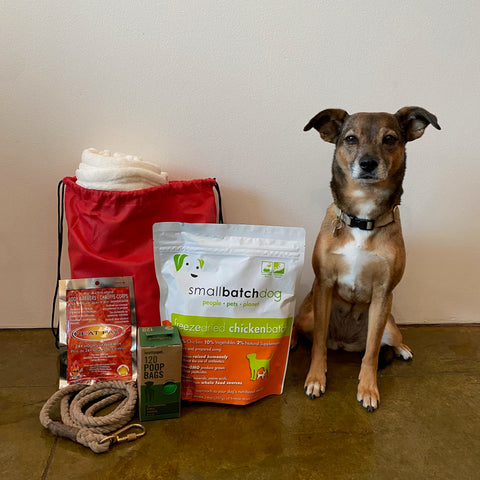As pet parents, we’re responsible for protecting our fur babies and doing what’s best to keep them safe and healthy. While this is typically done by ensuring their nutritional needs are met or that they can’t accidentally get into the street, there are rare, serious life events that we hopefully never have to experience, but need to be up-to-speed on cat and dog safety regardless.
No matter what part of the country you live in, natural disasters are a very real possibility that everyone should be prepared for. Healthy Spot is part of several California communities, so we’re accustomed to earthquakes and wildfires that can disrupt our way of life for a moment or months at a time. September is National Disaster Preparedness Month, we’re reminding you and ourselves to be ready for what life could throw your way.

Pet Emergency Preparedness Supplies You Need:
- Pet First-Aid Kit: While you should always have a first-aid kit for yourself in case of emergency, your pet would require different supplies if they’re ever hurt when you’re around. Kits typically include bandages, gloves, tick remover, an emergency blanket and more essential items pets could need in any event. It’s a great idea to keep two: one in your home and one in your car.
- Extra collar and leash: Ever been on a walk or drive and seen a lost pet roaming in the street? It’s handy to keep an extra collar and leash in your car if you’re able to get this pet to safety rather than trying to wrangle a frightened, lost dog while also keeping yours calm too. There are also events such as an evacuation or your dog’s leash breaking where you may need it for your own pup, so it’s smart to keep an extra set close. You can find a variety of leashes and collars at your local Spot.
- Portable Pet Water Bottle and Water: Heat can hit our pets fast. Having a portable water bottle like the Highwave AutoDogMug can make hydrating our pets in a moment of need so much easier until we can get them back home or in a cooler place to calm down. These bottles are easy to carry on your regular walks or weekend adventures like a hike. As for your emergency kit, the CDC recommends storing a 2-week supply of water for your pet.
- Microchip: In the event of an emergency, your pet could get lost, so it’s imperative that you have them microchipped to make it easier to track them down and reunite ASAP. If someone else were to find your fur baby and bring them into a local vet or rescue, this would also let their staff know that they have a home. Your veterinarian can microchip your pet or, as an alternative, check in with your local rescues to see which ones have microchip clinics with availability.
- Packaged Food And Treats: Sometimes, you’ll have to be away from home sooner and a lot longer than you expected without the option to swing by and pick up more food for your pet, so it’s best to have an emergency stash stored. Be sure to replace these as often as you need to ensure your pet’s emergency foods don’t expire. Next time you visit your local Spot, a team member can help you find the right shelf-stable food and treats to store if your pet's go-to meals aren't an option.
- More Supplies To Keep Close:
- ✓A printed copy of your pet's medical records
- ✓A 2-week supply of your pet's medication (if applicable)
- ✓A litter pan and litter (if you have a cat)
- ✓Extra poop bags (if you have a dog)
- ✓A flashlight
- ✓A blanket for warmth (if one isn't available in your first-aid kit)
- ✓A photo of your pet in case you're separated
- ✓Your pet's favorite toy
In addition to having emergency supplies on hand, be sure to have a plan in preparation for any event. Ask yourself these questions:
- 1. Are your emergency supplies easily accessible in the event that you’ll need them?
- 2. Do you have your vet’s contact information readily available and know where the nearest pet hospital is?
- 3. If you temporarily need to separate, do you have designated family or friends to house them?
- 4. Do you know when your supplies expire and how often you should replace them?
- Tip: If your products expire annually, set a calendar reminder for one month prior to restock!
COMMENT to let us know how you’re prepared for an emergency situation with your pet!



Comments (0)
There are no comments for this article. Be the first one to leave a message!